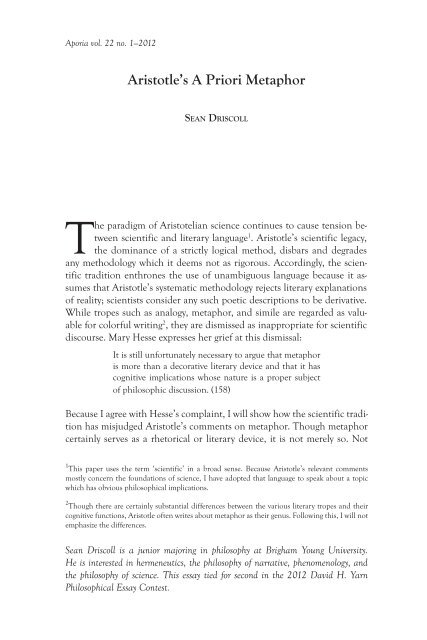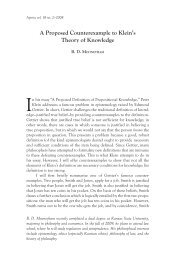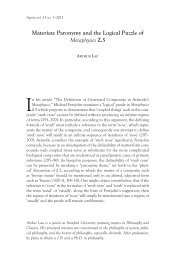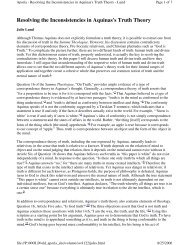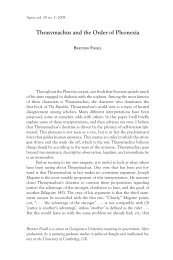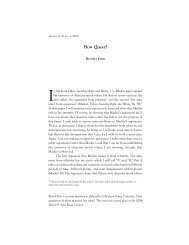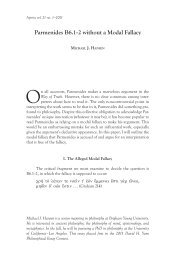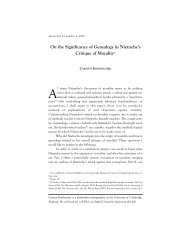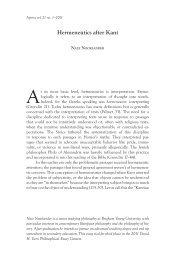Aristotle's A Priori Metaphor - Aporia - Brigham Young University
Aristotle's A Priori Metaphor - Aporia - Brigham Young University
Aristotle's A Priori Metaphor - Aporia - Brigham Young University
You also want an ePaper? Increase the reach of your titles
YUMPU automatically turns print PDFs into web optimized ePapers that Google loves.
<strong>Aporia</strong> vol. 22 no. 1—2012<br />
Aristotle’s A <strong>Priori</strong> <strong>Metaphor</strong><br />
Sean Driscoll<br />
The paradigm of Aristotelian science continues to cause tension between<br />
scientific and literary language 1 . Aristotle’s scientific legacy,<br />
the dominance of a strictly logical method, disbars and degrades<br />
any methodology which it deems not as rigorous. Accordingly, the scientific<br />
tradition enthrones the use of unambiguous language because it assumes<br />
that Aristotle’s systematic methodology rejects literary explanations<br />
of reality; scientists consider any such poetic descriptions to be derivative.<br />
While tropes such as analogy, metaphor, and simile are regarded as valuable<br />
for colorful writing 2 , they are dismissed as inappropriate for scientific<br />
discourse. Mary Hesse expresses her grief at this dismissal:<br />
It is still unfortunately necessary to argue that metaphor<br />
is more than a decorative literary device and that it has<br />
cognitive implications whose nature is a proper subject<br />
of philosophic discussion. (158)<br />
Because I agree with Hesse’s complaint, I will show how the scientific tradition<br />
has misjudged Aristotle’s comments on metaphor. Though metaphor<br />
certainly serves as a rhetorical or literary device, it is not merely so. Not<br />
1 This paper uses the term ‘scientific’ in a broad sense. Because Aristotle’s relevant comments<br />
mostly concern the foundations of science, I have adopted that language to speak about a topic<br />
which has obvious philosophical implications.<br />
2 Though there are certainly substantial differences between the various literary tropes and their<br />
cognitive functions, Aristotle often writes about metaphor as their genus. Following this, I will not<br />
emphasize the differences.<br />
Sean Driscoll is a junior majoring in philosophy at <strong>Brigham</strong> <strong>Young</strong> <strong>University</strong>.<br />
He is interested in hermeneutics, the philosophy of narrative, phenomenology, and<br />
the philosophy of science. This essay tied for second in the 2012 David H. Yarn<br />
Philosophical Essay Contest.
Aristotle’s A <strong>Priori</strong> <strong>Metaphor</strong> 21<br />
only does metaphor belong in Aristotle’s syllogistic system, but also it is<br />
of indispensable cognitive value—it uncovers the foundation from which<br />
discovery emerges. Aristotle himself affirmed this epistemological power of<br />
metaphor as prior to scientific explanation.<br />
Aristotle’s logical writings advance a system of scientific explanation<br />
through what Aristotle terms ‘definition’ 3 . A definition is the conclusion<br />
“reached by a process of reasoning” (Topica 153a 23-24). Aristotle calls this<br />
procedure the ‘dialectic’ or ‘syllogistic’ method. As its name suggests, this<br />
method leads to conclusions which are correct, necessary, clear, and unambiguous<br />
explanations of a thing. Nevertheless, Aristotle’s definition<br />
involves more than mere description. According to María Elena García,<br />
Aristotle’s<br />
defining is not exclusively the philological or semantic<br />
analysis of a word. It is not a mere erudite study. Defining<br />
means to arrive at the essence, at the being of a thing.<br />
It is therefore as difficult as it is necessary. Definition<br />
does not define words, but the reality hidden behind<br />
them. (72)<br />
For Aristotle, definition is not merely concerned with creating agreement<br />
in language; it can also use language to reach reality. Thus, he claims that<br />
“definition is an expression signifying the essence of a thing” (Topica 153a<br />
15-16). That is what definition aims at achieving through the dialectical<br />
method—definition is the correct scientific way to arrive at a thing’s essence.<br />
This process seems to be at odds with how Aristotle understands the<br />
function of metaphor. Stephen Halliwell describes how, “Although metaphor<br />
can be examined and classified, as it is in both the Poetics and the<br />
Rhetoric, it clearly remains resistant, in Aristotle’s eyes, to a ‘technical’ understanding”<br />
(349). <strong>Metaphor</strong> resists such mechanical delineation because<br />
it does not follow the same syllogistic path to truth that definition does.<br />
Definition is concerned with reaching a single, unambiguous meaning,<br />
whereas metaphor may admit a multiplicity of meaning. For this reason,<br />
Aristotle writes his most explicit criticism of metaphor. He claims that “dialectical<br />
disputation must not employ metaphors” and that “clearly metaphors<br />
and metaphorical expressions are precluded in definition” (Analytica<br />
Posteriora 97b 37-38).<br />
Could Aristotle have asserted a more definitive criticism of metaphor?<br />
In the quotation above, “Aristotle seems to defend the exactness of<br />
words, the perfect correspondence between concept and reality. When a<br />
3 Aristotle fully develops definition in Analytica Posteriora (II.13).
22<br />
Sean Driscoll<br />
person tries to discern the various ways in which something is said, metaphor<br />
seems to lose something of its richness” (García 80). When scrutinized,<br />
does metaphor measure up? Or does it dilute and obscure the relation<br />
between thought and reality? In the Analytica Posteriora, Aristotle’s<br />
apparently wholesale rejection of metaphor from logical activity causes a<br />
substantial problem: if metaphor is thus formally excluded from the dialectical<br />
process of definition, it follows that metaphor cannot adequately<br />
reach a thing’s essence.<br />
Despite this unavoidable conclusion, it remains unclear whether or<br />
not Aristotle actually denounces metaphor. Though in some cases Aristotle<br />
criticizes the use of metaphors in scientific discourse, he also intermittently<br />
affirms metaphor’s value for scientific discourse. This inconclusive usage<br />
leaves “much that remains highly suggestive, even enigmatic, in Aristotle’s<br />
treatment of metaphor” (Gordon 83). Nevertheless, Aristotle’s seemingly<br />
ambiguous position can be clarified by examining how he actually used<br />
metaphors in his own writing. Though Aristotle does not completely or systematically<br />
address metaphor’s positive function, he clarifies that function<br />
by frequently implementing metaphors in his writings.<br />
Those who claim that Aristotle denied the value of metaphorical explanation<br />
in science are left to explain this gaping inconsistency: Aristotle<br />
repeatedly explains scientific phenomena, especially the difficult ones, with<br />
metaphors. As with most writers, Aristotle employs metaphors almost inexhaustibly.<br />
Aristotle speaks metaphorically of everything from biology to psychology.<br />
His metaphors range in difficulty from his infamously challenging<br />
explanation of how sense perception gives rise to the grasp of the universal<br />
(by comparing the phenomenon with a “rout in battle” in Analytica Posteriora<br />
II.19) to more simple illustrations of how the parts of animals look like<br />
ordinary objects (in De Partibus Animalium).<br />
As Alfredo Marcos has pointed out, perhaps none of Aristotle’s uses<br />
of metaphor is as crucial as in De Anima. This treatise is “built upon a<br />
broad set of similes and metaphors, all used to explain the most difficult<br />
doctrinal points” (129). In describing the soul, Aristotle expounds: “suppose<br />
that eye were an animal—sight would have been its soul” (De Anima<br />
413a 19). Because the concept of the soul is so difficult to grasp, Aristotle<br />
uses several bodily metaphors in order to help his readers arrive at an<br />
understanding of its essence. Indeed, the entire treatise is saturated with<br />
metaphorical explanations, without which the text would be almost impossible<br />
to understand. In fact, according to Marcos, “without metaphor,<br />
there would be no De Anima at all” (126). Aristotle’s reliance on metaphor<br />
demands further investigation into metaphor’s positive role in scientific description.<br />
Analysis of his usage provides the affirmative link between logical<br />
discourse and metaphor.
Aristotle’s A <strong>Priori</strong> <strong>Metaphor</strong> 23<br />
Nevertheless, Aristotle scholars have largely neglected an analysis of<br />
this interpretive clue. This oversight has contributed to metaphor’s unchecked<br />
dismissal from the scientific realm.<br />
Thus, if Aristotle did affirm the explanatory function of metaphor,<br />
then the scientific tradition that has followed his supposed rejection of<br />
metaphor is mistaken. Marcos shows how, “On the basis of [Aristotle’s]<br />
texts, subsequent tradition abolished the cognitive dimension of the Aristotelian<br />
theory of metaphor” (125). Taking what they supposed to be a cue<br />
from Aristotle, scientific theorists have excluded metaphor from the scientific<br />
method, thus exiling it to the realm of poetry and rhetoric. By doing<br />
this, theorists have created a standard which “excludes from science practically<br />
everything that is, in fact, characteristic of it” (Popper 53). In other<br />
words, scientific and literary language are not fundamentally divorced from<br />
each other. A more inclusive understanding metaphor would eliminate this<br />
false dichotomy created by the tradition; seeing metaphor as more than a<br />
colorful illustration does not compete with or disrupt the logical process of<br />
definition; rather, metaphor underlies and supports definition.<br />
Understanding the relationship between definition and metaphor<br />
provides a way out of the flawed tradition which has mistakenly followed<br />
Aristotle away from the use of metaphor. Even if metaphor has a primordial<br />
role in scientific discourse, it nevertheless does not follow the same<br />
dialectical process as definition. In his Topica, Aristotle claims that, when<br />
something has been defined, “it is impossible that anything else should be a<br />
definition” (153a 21-22). In other words, the dialectic defines something by<br />
making it necessarily true. <strong>Metaphor</strong> does not provide this same certainty,<br />
and it would be a flaw to treat metaphor in this way. Nevertheless, such<br />
an approach seems to prevail in Aristotle scholarship; such writers attempt<br />
to force metaphor to conform to the definition model of language. Like<br />
many scholars, Stephen Halliwell describes how metaphor, as part of the<br />
poetic system, is a rationally describable element of language. He claims<br />
that it “rests, like all Aristotelian arts, on determinate and discoverable<br />
principles 4 ” (90).<br />
Thus, strict dedication to a definition-based science has caused many<br />
to see metaphor as mathematically objective. Hesse describes the result of<br />
such a view: “The ideal physical theory would be a mathematical system<br />
with deductive structure similar to Euclid’s, unencumbered by extraneous<br />
analogies or imaginative representations” (3). In this model, metaphor<br />
4 Nevertheless, even Halliwell is left to claim that metaphor “clearly remains resistant… to a ‘technical’<br />
understanding” (349). Even theorists that are committed to the definition-based paradigm<br />
usually have reservations when it comes to the question of metaphor. They simply cannot decide<br />
where to put it.
24<br />
Sean Driscoll<br />
would clearly have no place in scientific theorizing. Though few thinkers<br />
would go so far as to claim that “metaphor leaves logic in abeyance” (Gordon<br />
89), most would certainly agree that metaphor is not reducible to a<br />
series of mathematical formulae. <strong>Metaphor</strong> is not a variable in an equation.<br />
Such a mathematical orientation suggests that metaphor is a placeholder<br />
for a word or a concept: if needed, a person could readily exchange<br />
a metaphorical expression for a literal one. Samuel Levin describes some<br />
theorists’ opinion that “language …may suffer gaps. For Aristotle, when<br />
such a gap is filled for the first time, the result is a metaphor” (27). Does<br />
metaphor really function as a temporary substitution for more rigorous<br />
language? Does it merely articulate language’s weak points? The result of<br />
this point of view is that “when a metaphor extends the range of a generic<br />
or specific predicate, it does not break new categorical ground; it<br />
simply extends a predicate into a position which, from the standpoint of<br />
the categories, already existed and was logically prepared for it” (Levin 28).<br />
If metaphor’s function is thus simply a step in the evolution of a language,<br />
then, once the language becomes capable, it would theoretically be able to<br />
replace the metaphor with a more suitable predicate. Paul Ricœur believes<br />
that Aristotle did not see metaphor in this way. He claims that<br />
metaphor is more than a simple substitution of putting a<br />
[metaphorical] word in the place of a literal word which a<br />
comprehensive paraphrase would be capable of reconstituting<br />
in the same place. The algebraic sum of these two<br />
operations of substitution by the speaker and of restitution<br />
by the author or by the reader is equal to zero. No<br />
new meaning emerges and we learn nothing. (101)<br />
But we do learn. In fact, metaphor helps us discover new things that are<br />
only possible because of metaphor’s unique function; deductive language<br />
is not capable of leading to this discovery in the same way. <strong>Metaphor</strong> is<br />
more than just a place-holder because it has a genuine function in disclosing<br />
truth. N.R. Campbell echoes this sentiment; according to Campbell,<br />
metaphorical expressions<br />
are not ‘aids’ to the establishment of theories; they are<br />
an utterly essential part of theories, without which theories<br />
would be completely valueless and unworthy of the<br />
name. It is often suggested that the analogy leads to the<br />
formulation of the theory, but that once the theory is formulated<br />
the analogy has served its purpose and may be<br />
removed and forgotten. Such a suggestion is absolutely<br />
false and perniciously misleading. (Hesse 5)<br />
This “suggestion” comes from the traditional paradigm. It is deceptive be-
Aristotle’s A <strong>Priori</strong> <strong>Metaphor</strong> 25<br />
cause tropes are not place-holders and cannot be substituted; the literal<br />
cannot simply exchange or substitute for the metaphorical. Rather, metaphors<br />
generate genuine and fundamental discoveries.<br />
If metaphor is capable of this disclosure, then why does Aristotle discuss<br />
it mainly in the Rhetoric and the Poetics? Most of Aristotle’s criticisms of<br />
metaphor, including his comments in the Analytica Posteriora, are the result<br />
of an obsession with precision. This concern is likely a reaction to the casuistries<br />
of Aristotle’s contemporaries, the sophists. Aristotle criticizes the<br />
sophists for deliberately obscuring their language to win arguments. His<br />
discussion of metaphor in the Rhetoric thus aimed at exposing the sophists’<br />
ambiguous language. In the Rhetoric, Aristotle claims that correct use of<br />
language seeks “to avoid ambiguities; unless, indeed, you definitely desire<br />
to be ambiguous, as those who have nothing to say but are pretending to<br />
mean something. Such people are apt to put that sort of thing into verse”<br />
(1407a 32-35). In this passage, Aristotle is not criticizing metaphor per se,<br />
but is obviously opposing the sophists. Here, the only alternative to his logical<br />
method is caricatured as having nothing to say, much like the equivalent<br />
critique of the sophists in De Sophisticis Elenchis (165a 13-36). Clearly, at<br />
least one of Aristotle’s concerns in the Rhetoric was to expose sophistry,<br />
whose techniques apparently involved the use of metaphorical language.<br />
Aristotle also depreciates metaphor because of its ornamental function<br />
in poetic writing. According to Aristotle’s Rhetoric, metaphors are to<br />
“help give your language impressiveness” (1407b 26-27). The footnote to<br />
the Roberts translation of this passage indicates that “the Greek word [for<br />
impressiveness] sometimes means ‘inflated diction,’ ‘bombast,’ ‘pomp,’<br />
‘grandiloquence,’ rather than ‘dignity’ ” (1407b 27, 176). This usage obviously<br />
derides the function of metaphor. Aristotle follows this statement by<br />
claiming that one of metaphor’s functions is merely to make “lively and<br />
taking sayings” (1410b 6-7). How can these statements be reconciled with<br />
the idea that metaphor’s function is more than rhetorical? Is metaphor<br />
simply to impress or entertain?<br />
Alfredo Marcos proposes an explanation for Aristotle’s denunciation<br />
of metaphor. He claims that Aristotle does not criticize metaphors in general,<br />
but that his “criticism is leveled at the quality of the figures, not at their<br />
metaphorical nature” (124). In other words, a majority of Aristotle’s criticism<br />
of metaphor is really just to assure the appropriate use of metaphor,<br />
which is why he puts the discussion in the Rhetoric. Accordingly, Aristotle<br />
claims that “Some [metaphors] are [bad] because they are ridiculous; they<br />
are indeed used by comic as well as tragic poets. Others are too grand and<br />
theatrical; and these, if they are far-fetched, may also be obscure” (Rhetoric<br />
1406b 7-8). Instead of disavowing metaphor, Aristotle’s comments can thus<br />
be read as renouncing the poor use of metaphor. Marcos explains that “if
26<br />
Sean Driscoll<br />
we use a metaphor to obscure our discourse, then it will lack any justification<br />
in scientific texts. It should not be a means of expressing obscurely<br />
what can be said plainly, but rather a way of expressing difficult matters<br />
as clearly as possible, a manner of stretching language into new areas of<br />
reality” (127).<br />
Though several of Aristotle’s statements about metaphor seem to belittle<br />
its function, it is clear that, taken as a whole, Aristotle seeks to achieve<br />
something much greater in scope than mere rhetorical wordplay. Though<br />
he does write about metaphor mostly as a rhetorical tool, Aristotle’s “larger<br />
purpose is to explain how metaphor promotes to consciousness an awareness<br />
of relations that subsist between the objects and concepts that make<br />
up our universe” (Levin 25). Ricœur asks a provocative, commonsensical<br />
question that illustrates this claim:<br />
Why would we draw new meanings with our language,<br />
if we had nothing new to say, [or] no new world to project?<br />
The creations of language would be devoid of sense,<br />
if they did not serve the general project of letting new<br />
worlds emerge by the grace of metaphor. (112)<br />
We would not use metaphorical language the way that we do if there were<br />
nothing beyond it—if there was nothing new that metaphor is uniquely<br />
capable of disclosing. <strong>Metaphor</strong> is the creative and novel use of language<br />
which discloses truth, yet “we do not cease in linking metaphor’s creative<br />
process to a non-creative aspect of language” (Ricœur 103). In order to<br />
understand this creative function of metaphor, it is necessary to branch<br />
out from its rhetorical uses. Accordingly, Mauricio Beuchot describes how<br />
“that which is used to encode serves to decode” (233). By stretching language<br />
rhetorically, metaphor uncovers meaning.<br />
Hesse recognizes this disclosure. She believes that Aristotle’s metaphors<br />
are more than simple illustrations. Rather, they are metaphysically<br />
expressive. She claims that such metaphors “seem to be concerned with the<br />
understanding of metaphysical terms” (147). <strong>Metaphor</strong>ical language does not<br />
exist merely to suggest a new gap for literal language to fill. Rather, these<br />
deep metaphors actually establish connections with metaphysical aspects<br />
of reality.<br />
Aristotle’s rhetorical analysis of metaphor suggests this capacity—the<br />
rhetorical function of metaphor indicates what metaphor accomplishes<br />
on a deeper level. Aristotle recognizes this penetrating capability when he<br />
claims that metaphor “gives style clearness… and distinction that nothing<br />
else can” (Rhetoric 1405a 4-8). Thus, Beuchot’s statement that Aristotle’s<br />
“tropes … work as well to encode a discourse or a text as they do to decode<br />
it” (219) perhaps best shows why “metaphor is of great value in both poetry
Aristotle’s A <strong>Priori</strong> <strong>Metaphor</strong> 27<br />
and prose” (Rhetoric 1405a 4-8): metaphor, the rhetorical device, decodes<br />
or discovers meaning. In this way, rhetoric’s function exceeds the ornamental—a<br />
text employs metaphorical language not to decorate, but to disclose.<br />
Aristotle’s recognition of metaphor’s disclosive function is echoed by<br />
Ricœur, who describes how “the meaning of a text is not behind the text,<br />
but out in front of it. It is not something hidden, but something that is discovered<br />
and open” (107). According to Ricœur, metaphor not only opens<br />
the text, but keeps it open. <strong>Metaphor</strong> does not stand between meaning and<br />
the learner. Rather, metaphor pushes meaning out in front of itself. It does<br />
not hide meaning behind the rhetoric of the text, but discloses it by creating<br />
openness in the text. Thus, metaphor is not purely ornamental, but is<br />
functional in a more fundamental way. It is what primarily discovers.<br />
This fundamental discovery is how metaphor gets at the essence of<br />
a thing. And it does so more fundamentally than Aristotle’s definition—in<br />
fact, discovery is what makes definition possible in the first place. According to<br />
Marcos, “The logical apparatus of definition and demonstration does not<br />
work properly unless a connection is provided between theoretical terms<br />
and our experience of concrete reality” (134-135). This connection is not<br />
provided by the dialectic method used to reach definition. In fact,<br />
the judgment about truth of principles used as premises<br />
in deduction, the ascription of reference to the terms,<br />
the knowledge of causal connections concealed behind<br />
logical ones, all remain outside the logical apparatus of<br />
[the Analytica Posteriora]. (Marcos 135)<br />
The method of Aristotle’s logical treatises, though dialectically rigorous,<br />
requires that certain connections and references have already been made.<br />
Karl Popper shows how “no scientific theory can ever be deduced from<br />
observation statements, or be described as a truth-function of observation<br />
statements” (53).There is an underlying connection that allows those observations<br />
to progress to theory. In this progression, theories develop by<br />
knowledge of relations which proceeds by something more like invention<br />
and creative guess. This movement is not defensible in the same way as definition,<br />
but it is nevertheless necessary for the creation of scientific theory.<br />
It is accomplished by metaphor. Only when metaphor has brought the<br />
necessary relation into view can definition proceed.<br />
<strong>Metaphor</strong> achieves this type of underlying understanding by provoking<br />
the reader to active discovery. <strong>Metaphor</strong> “requires us to see what is in<br />
front of us as different from what it at first seemed to be” (Davis 123). This<br />
linguistic diversion makes it so that “understanding new metaphors often<br />
requires an interpretative effort” (Marcos 128), which is a creative act. In<br />
fact, “Spotting resemblances for the first time requires the invention of new
28<br />
Sean Driscoll<br />
points of view, of new interpretative hypotheses, of new and fallible conjectures”<br />
(Marcos 133 emphasis added). Aristotle explicitly recognizes this<br />
cognitive function of metaphor in his Poetics where he claims that “good<br />
metaphor implies an intuitive perception of the similarity in dissimilars”<br />
(1459a 9). In other words, metaphor relies on our ability to discover relationships<br />
between dissimilar things; it requires us to actively interpret the<br />
observed world. According to Marcos, “This heuristic task yields the poetic<br />
discovery of new analogic relationships. Every good metaphor is followed by<br />
what might be called a heuristic inertia” (136).<br />
The unique discovery accomplished by metaphor creates relations<br />
in a different way than the standard scientific procedure. Karl Popper describes<br />
how theory “should proceed from some simple, new, and powerful,<br />
unifying idea about some connection or relation...between hitherto unconnected<br />
things...or facts...or new ‘theoretical entities’ ” (326). This developed<br />
relation is not, however, the kind of syllogistic relation that we normally attribute<br />
to the scientific process. In fact, these types of connections do not<br />
even occur in the traditional understanding of scientific method. Some<br />
theorists claim that “there is seldom in fact a deductive relation strictly<br />
speaking between scientific explanations and explanandum, but only relations<br />
of approximate fit” (Hesse 172). This approximate fit is not simply a<br />
deductive matter, but “a complicated function of coherence with the rest of<br />
a theoretical system, general empirical acceptability throughout the domain<br />
of the explanandum, and may other factors (172). These factors require<br />
connecting previously unrelated truths through an ability to both discover<br />
and create. Ricœur describes this phenomenon:<br />
to speak of properties of things (or of objects) which<br />
would not yet have been signified would be to admit that<br />
the new emergent meaning is drawn from nowhere, at<br />
least nowhere in language...Saying that a new metaphor<br />
is not drawn from anywhere, that is to recognize it for<br />
what it is, namely an instantaneous creation of language,<br />
a semantic innovation that is not static in the language,<br />
inasmuch as it is already established, neither with respect<br />
to the designation nor with respect to the connotation.<br />
(103)<br />
<strong>Metaphor</strong>s emerge as creative innovations. They form language to accomplish<br />
what its structure before could not attain. Aristotle describes that<br />
they have the effect of “making your hearers see things” (Rhetoric 1411b 24).<br />
<strong>Metaphor</strong>ical inventions thus allow language to bring new truths into view.<br />
They inspire the legitimate discovery of new things. That is why Aristotle<br />
makes his monumental claim that
Aristotle’s A <strong>Priori</strong> <strong>Metaphor</strong> 29<br />
we all naturally find it agreeable to get ahold of new<br />
ideas easily: words express ideas, and therefore those<br />
words are the most agreeable that enable us to get ahold<br />
of new ideas. Now strange words simply puzzle us; ordinary<br />
words convey only what we know already; it is from<br />
metaphor that we can best get ahold of something fresh.<br />
(Rhetoric 1410b 10-15 emphasis added)<br />
Since metaphor most effectively brings truths into view, it is the basis for<br />
definition. In other words, for something to be defined by the rational<br />
dialectical process, it must have already been grasped by the process. <strong>Metaphor</strong><br />
makes that possible by originally bringing the phenomenon into<br />
view. Nevertheless, metaphor does not undermine definition, but rather<br />
is a supportive basis for it. Hesse understands this and describes how, in<br />
a similar fashion, metaphor is a natural extension of a rational process.<br />
She explains how “rationality consists just in the continuous adaptation of<br />
our language to our continually expanding world, and metaphor is one of<br />
the chief means by which this is accomplished” (177). In other words, the<br />
creative force of metaphor brings us meaning when our knowledge of the<br />
world is expanding. Marcos describes how dialectical<br />
processes all require the use of a projective imagination<br />
based on our structured experience” which combine<br />
with heuristic understanding to “bring us meaning in a<br />
direct way. (129)<br />
<strong>Metaphor</strong> generates meaning directly because it gathers the scientific phenomenon<br />
originally into view. Once metaphor has brought truths into<br />
view, the dialectic is able to define them. This is likely what Aristotle had<br />
in mind when he wrote that metaphor “is the one thing that cannot be<br />
learnt from others” (Poetics 1459a 8). It “cannot be learned because it is the<br />
underlying condition of all learning” (Davis 128).<br />
Because it underlies the procedures upon which scientific knowledge<br />
is based, metaphor is a foundational necessity for essential knowledge. The<br />
scientific point of view that such essential knowledge can be reached only<br />
by dialectical reasoning is thus flawed. It is likewise mistaken if it assumes<br />
that Aristotle originated this perspective. Rather, Aristotle recognized the<br />
disclosive role of metaphor, and he clarified his position through his usage.<br />
He makes this practical clue explicit in his Rhetoric where he suggests<br />
that metaphor is valuable as more than a rhetorical or literary device. His<br />
emphasis on the proper application of the trope thus affirms metaphor’s<br />
ability to initiate fundamental disclosure. Therefore metaphor, traditionally<br />
seen only as a rhetorical or poetic device, has far more of a role in
30<br />
Sean Driscoll<br />
disclosing truth; in fact, it underlies any dialectical disclosure. <strong>Metaphor</strong><br />
thereby becomes the basis for definition, but it does not displace definition—Aristotle’s<br />
rigorous method of definition is still capable of advancing<br />
to the essence of a thing. Though definition and metaphor proceed differently,<br />
both nevertheless grasp a thing’s essence. But metaphor does it first.
Works Cited<br />
Aristotle. Analytica Posteriora, trans. G.R. Mure, in The Works of Aristotle.<br />
Vol. I, ed. W. D. Ross. London: Oxford UP, 1928.<br />
———. Categoriae and De Interpretatione, trans. E. M. Edghill, in The Works of<br />
Aristotle. Vol. I, ed. W. D. Ross. London: Oxford UP, 1928.<br />
———. Rhetoric and Poetics. Trans. W. Rhys Roberts and Ingram Bywater. New<br />
York: Modern Library, 1954.<br />
———.Topica and De Sophisticis Elenchis, trans. W.A. Pickard-Cambridge, in<br />
The Works of Aristotle. Vol. I, ed. W. D. Ross. London: Oxford UP,<br />
1928.<br />
Beuchot, Mauricio. “Retórica y hermenéutica en Aristóteles” Noua tellus.<br />
25.1 (2007): 217-234.<br />
Davis, Michael. Aristotle’s Poetics: The Poetry of Philosophy. Lanham: Rowman<br />
and Littlefield Publishers, Inc., 1992.<br />
Gacría, María Elena. “Límites de la crítica aristotélica a la metáfora.”<br />
Tópicos. 23 (2002): 71-97.<br />
Gordon, Paul. “The Enigma of Aristotelian <strong>Metaphor</strong>: A Deconstructive<br />
Analysis.” <strong>Metaphor</strong> and Symbolic Activity. 5.2 (1990): 83-90. Web.<br />
Halliwell, Stephen. Aristotle’s Poetics. London: Gerald Duckworth & Co.<br />
Ltd., 1986.<br />
Hesse, Mary B. Models and Analogies in Science. Indiana: <strong>University</strong> of Notre<br />
Dame Press, 1966.<br />
Levin, Samuel R. “Aristotle’s Theory of <strong>Metaphor</strong>.” Philosophy and Rhetoric.<br />
15.1 (1982): 24-46.<br />
Marcos, Alfredo. “The Tension Between Aristotle’s Theories and Uses of<br />
<strong>Metaphor</strong>.” Studies in History and Philosophy of Science. 28.1 (1997):<br />
123-139.<br />
Popper, Karl. Conjectures and Refutations: The Growth of Scientific Knowledge.<br />
London: Routledge & Kegan Paul, 1963.<br />
Ricœur Paul. “La métaphore et le problème central de l’herméneutique.”<br />
Revue Philosophique de Louvain. 4-70.5 (1972): 93-112.


